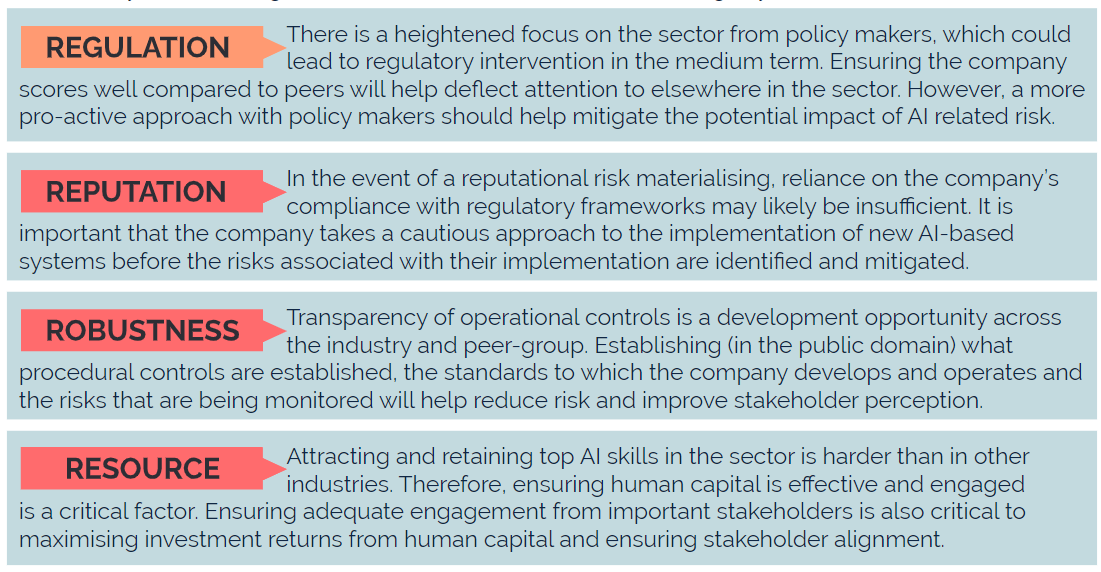
One of my readers picked me up on my articles about the use of customer data, AI and open banking last week, saying that I had missed a critical point. What had I missed? Well, the discussions were mainly about the use of customer data for marketing, advice, safety, security, risk and compliance … but it’s more than this. It’s also about ethics.
They made clear that most banks have a purely ‘commercial’ view of compliance, as in that there may be regulatory fines … but that's just the cost of doing business. The additional insight they gave me is that there may be a higher risk of alienating customers by not managing stakeholder risks around ethics.
By way of example, an independent analysis of JPMorgan’s ethics found them to be doing pretty well. This report by Ethics Grade on JPMorgan’s ethics, produced, an independent ESG company powered by AI, gives a good insight.
Two things stood out for me in this report. The first is the scorecard used, which balances the banks commitment to regulation, reputation, robustness and resaourfe risks.
That’s a nice scorecard.
The second is that JPMorgan is third in their peer group for ethics and in the 83rd percentile of all companies, ranked as a C grade. In other words, they’ve scored pretty well, and are in the top four out of five firms for ethics. Woo-hoo! But they could still do better, as evidenced another recent report that found American banks specifically to be pretty unethical when it came to investments in companies that trash the planet and sell weapons to enemies of the state.
US banks named as being among least ethical UK operators
Two US banking giants … have been ranked among the “worst” providers by researchers because of their policies on issues such as the climate crisis and weapons. Goldman Sachs and JPMorgan Chase both scored poorly due to their records on the environment, human rights and paying tax, according to a new study by Ethical Consumer magazine.
This means there is considerable room for improvement. So, what to do? What to do is to be ethical by design. What does that mean? Well, another friend sent me this report that relates specifically to this space:
Written by Charles Radclyffe and Richard (Dick) Nodell*, it’s an interesting take on the subject.
The paper dropped in 2020, and reflected on the scandal related to Cambridge Analytica/Facebook, and how to manage ethics in the context of digital technologies. They state that the problem is not simply that ethics, as a domain of governance, is not well understood by the technology industry, but that it is either restricted in mainstream dialogue to a discussion of risk and safety issues, or it is conflated with regulatory compliance.
The terms used to for structures to manage ethics, such as ‘Ethics Boards’ and ‘Ethics Councils’ are also used interchangeably.
Charles and Dick’s paper proposes to define digital ethics in terms where it becomes clear that it is seen as a completely separate topic of governance to regulatory compliance, technical risk and safety management.
Well worth a read and, overall, I agree. Ethics is a topic in its own right and increasingly important in today’s world of customer data abuse but, imho, it has to be part of a development of a complete data model that incorporates risk, regulation, marketing, advice and digital data analytics in general.
* Charles is a Forbes contributor and has presented around the world on subjects relating to the field of technology and societal change, including two TEDx talks which are available online. Richard (Dick) has a career that spans over four decades, specialised in working with leaders of large complex organisations including Goldman Sachs, American Express, IBM, and AT&T.
Chris M Skinner
Chris Skinner is best known as an independent commentator on the financial markets through his blog, TheFinanser.com, as author of the bestselling book Digital Bank, and Chair of the European networking forum the Financial Services Club. He has been voted one of the most influential people in banking by The Financial Brand (as well as one of the best blogs), a FinTech Titan (Next Bank), one of the Fintech Leaders you need to follow (City AM, Deluxe and Jax Finance), as well as one of the Top 40 most influential people in financial technology by the Wall Street Journal's Financial News. To learn more click here...


